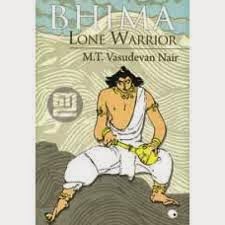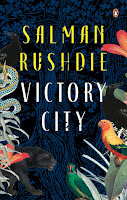By M.T. Vasudevan Nair
To keep my resolution to read more Indian regional language
fiction, (obviously in translation, since tragically my knowledge of the Indian
languages I know – Malayalam, Tamil and Hindi – is so superficial, it would
take enormous patience to read in the original), I picked up this one by MT. I
had heard of it from my mother and I knew this was a book I would enjoy. I
mean, how could you not enjoy a re-telling of the Mahabharata? And if it was a
re-telling by one of the all-time greats, it had to be good, right?
I loved it. It is the Mahabharata from Bhima’s perspective.
The Bhima we know is huge, with a large appetite, very strong, very
short-tempered and utterly devoted to his family. We don’t give him much
thought except as the muscle man of the Pandavas. MT’s Bhima is all of this;
but he is also introspective and intelligent, a brooding, sensitive giant,
somewhat of an outsider, with an ability to see his mother and brothers and
wife with all of their flaws, yet unable to ever walk away.
The stories are all so very familiar. But MT strips them of
any of the ‘divinity’ we have come to expect from them. Kunti’s 6 lovers who
beget her sons are not really gods, but mortals whose special qualities are transferred
to her sons. Krishna is not particularly divine – he is just a canny,
politically astute friend. There is no divine help for Draupadi when she is
disrobed – Dhritarashtra is prevailed upon to stop the dishonour. We are told
in the epilogue that there are hints of these in the original, and that MT has
just added his bit of imagination to re-tell them. The re-telling transforms
the Mahabharata into an absorbing but simple tale of tribal warfare, a tale
that has been embellished by bards with every re-telling, until we get to the
epic it is today.
In some ways, this is a very subversive tale. Bhima sees the
injustice women are subjected to – be it his own treatment of Hidimbi and
Balandhara or Arjuna’s dalliances with his innumerable women. He also sees the
inequality the ‘forest-dwellers’ have to deal with – as with his own son
Ghatotkacha who Krishna sacrifices for Arjuna or the forest dwellers whose dead
bodies take their place in the fire that consumes the palace of lac. He is also
cynical about the philosophy Krishna spouts (that becomes the Gita), saying
that when your own sons and brothers die, it is difficult to see the bodies their
souls have cast away as ‘discarded clothes’.
MT’s Bhima sees the cowardice and double standards in his
older brother’s ‘Dharma’. He knows how manipulative his mother is – be it
sacrificing forest dwellers in the lac house fire, or asking Draupadi to be
shared between the five brothers or using Karna’s back story to save her sons’
lives. He knows his own weak spot – Draupadi, who is turned on by stories of
violence, who manipulates him to get what she wants, yet who never gives him
the love he craves. He keeps his distance from Krishna, who he knows is his
younger brother’s greatest friend, but understanding his political
machinations, as well.
This is an all-seeing Bhima, but one who never shirks from
doing what he needs to do for his family. He knows war is inevitable, craves
for it to avenge the injustice done to Draupadi and his family and when it
comes, gives it his all. And at the end, on the Pandavas’ quest to reach
heaven, he is unable to not turn back to pick up his beloved Draupadi as she
falls, and so sacrifices his entry to heaven.
It is a fascinating character study – it surprises and
delights, as you see these stories you have heard from childhood in a new
light. There is poetry in the descriptions of the landscapes. And ultimately,
the tale in the hands of a master storyteller is un-put-down able. Maybe I
should find the patience to read this in the original.




